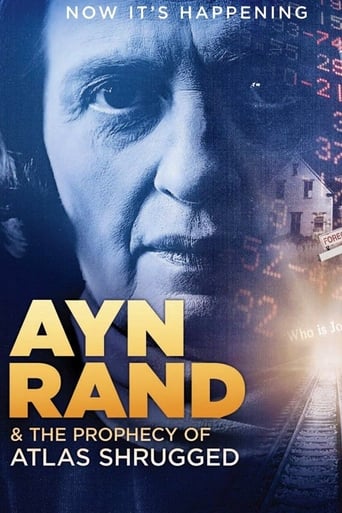Schatz87
A documentary that appeals to insouciant libertarians, neophytes in economics, and everything in between. The filmmakers have succeeded in amassing an impressive range of political hacks and starry-eyed apostles that are more than willing to espouse their unbridled adulation of Rand. Viewers are richly rewarded with both a flattering homage to the person Ayn Rand as well as receiving a treat of mental masturbation to her philosophical ideas.The two interviewees with more substantive understanding are Jennifer Burns and Anne C. Heller, which both have written purportedly comprehensive books on the topic. All in all the documentary briefly touches upon Rands privileged childhood in Russia, semi-forced escape to the US in the mid-1920s, to the harsh criticism in the media after the publication of Atlas Shrugged. Objectivism and her magnum opus are slightly expanded upon, while all critical viewpoints are conspicuously absent. Moreover, what is further lacking is any discussion of the character flaws and hypocrisy Rand displayed in her personal life.The main problem with the implied prophesy of the novel - and the most crucial piece that Rand got completely backwards - was the expected cronyism of the "big government". In reality the problem in US was always an exceptionally strong and overpowering private sector, which has been able to water down regulations and any attempts to rein in its power. This has concerned everything from a lax oversight of Wall Street, to curbing polluting industries, to ensuring America has became inundated with guns and fire arms, to an ever-mushrooming military-industrial complex... At the core the problem was never the naive and idiotic fantasy of secretive government churning out Soylent Green, but an unhinged private sector that won every battle against ordinary people by a cadre of K-Street lobbyists, bought republican politicians, and well-funded media campaigns propagating misinformation.In fact, after the global meltdown of financial markets in 2008 even the ex-fed chairman Alan Greenspan, the early disciple Ayn Rand ever since the 1950s, had to admit that the outcome of a free, unregulated market was complete financial disaster.Finally, what clearly detracts from the documentary is having an entire conveyor belt of asinine opinions and mind-boggling ignorance regurgitated by a series of ever dumber pea-brained minions.
house-661-766449
This film captures the energy of the time when people were ardently seeking solutions to the ills that faced society. The film covers the context of the time in which she wrote her novels. She is a visionary that has hits and misses. It was really not easy for a woman of that time to step out in the public eye to have a thousand tomatoes thrown at her (figuratively) for speaking her mind. See the PBS Documentary called "The Warning" with regards to her most famous student, Alan Greenspan. Her theories are as controversial today as they were a half century ago. Even today, there are scholarships given to students who will read her books and submit essays on them. She has remained relevant even to this day due to her ardent followers.
ted-socha
The House Un-American Activities Committee (HUAC) became a permanent (or "standing") committee of the House in January 1945. It had existed on a temporary basis since 1938. HUAC was supposed to investigate "un- American propaganda" in the United States. Although it also investigated pro-fascist or pro-Nazi activity, HUAC is most widely known for its investigations of suspected Communist influence in the late 1940s and early 1950s. Along with the investigation of Alger Hiss, the investigation of Communist influence in the motion picture industry is one of the defining episodes in the committee's history. HUAC would continue to exist into the 1960s, but these memorable hearings are its best-known legacy. The committee's name was changed in 1969, and it was abolished in 1975, when jurisdiction over investigation of foreign influence was transferred to the House Judiciary Committee.2HUAC and HollywoodThe first HUAC investigations of Communism in Hollywood occurred in 1940, when Representative Martin Dies, a Texas Democrat, was chairman of the committee. Dies convened meetings of the committee in Los Angeles and questioned several actors and writers, including actor Humphrey Bogart and writer John Howard Lawson. All denied either being Communists or knowing with certainty that any of their co-workers were Communists. These early hearings ended with Dies finding no credible evidence of Communist activity in the movie industry. Once the United States entered World War II in 1941, the Soviet Union was an ally, and Congress had little interest in exposing any Communist activities in Hollywood.
gitardood
Most reviewers focus on the so-called "battle" between altruism and selfishness as Rand saw it. Methinks, that both Rand and most reviewers tried to hard to stake out a mutually exclusive territory and defend it. For me, I think that the state should not be compelling via taxation or any other means at their disposal, the populace to be their brother's keeper. Where I part ways with Atlas Shrugged, is selfishness is not a virtue. If those who would like to see an end to gov't sponsored socialism, would realise that individuals then become responsible like the Good Samaritan, for helping the less fortunate, in such a way as to not create dependency on hand outs, then possibly the edifice of state sponsored "charity" ie taxes to "aid" the less fortunate, could be eliminated. Even the Bible says we are to help without encouraging dependency and indolence.

